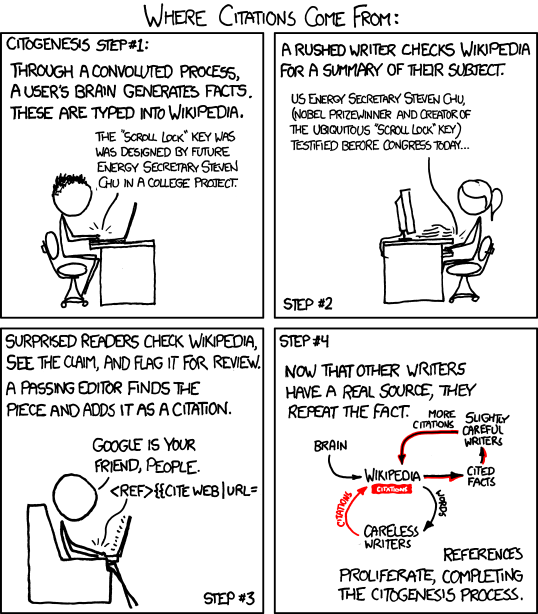Wikipedia is nefarious as fuck and nobody should trust it.
Here is an alternative Piped link(s):
https://piped.video/tExxkV1Xgzg?si=cqgkEghiy9a9m4aG
Piped is a privacy-respecting open-source alternative frontend to YouTube.
I’m open-source; check me out at GitHub.

I feel bad for you
Because people have a different opinion than you, you feel “bad” for me? Well I don’t feel a bit bad for you.
I feel bad for you because this guy is hackish and you obviously respect him. If I could save every rube I would but I just can’t. So I feel sorry instead.
🤡
wah wah
Try to draw your own conclusions instead of just being a follower. That applies to all political stances and life in general
Wikipedia was useful for me as a grad student because I could look up a topic and there would be a whole lot of citations I could follow. I never used them as a source, but rather as a curated forum of information.
Wikipedia is like our dear friend. It gives us general information, good advice, and direction in life, but never gets too deeply in it. The choice is ours to make.
Only problem is that half of them are broken :(
You’d be impressed by how good I was at finding PDFs of original articles on random sites. Turns out that when you go to grad school in the third world and don’t have access to the journals in the same way as you are accustomed, you learn how to do it for yourself.
sci-hub
This was back in 2010-ish. Don’t know if it works the same way now, there are probably better ways to go about it. Not sure if sci-hub existed at that time. Will remember that going forward.
I’ve been doing exactly the same thing with LLMs recently.
"Tell me about "
“What are the big problems their industry is trying to solve?”
“Who are their biggest competitors?”
“What’s the worst/best thing about them?”Questions like that often give me a great framework to look up specific questions, find relevant articles and get a handle on the sources that are likely to be useful.
I’d definitely be careful about made up stuff, but this sounds like an interesting idea.
Very careful. I never use anything from them directly. I just use them to give me a starting point on what to look for.
For example, if the AI tells me that some company is know for their low latency database, I’ll look around for primary sources on the latency of the database compared to other vendors. I’ll also look for evidence to the contrary.
I always trust the streets. People lie. Governments lie. News lies. But the streets. The streets never lie.
I do for economic data. I really don’t care what funny numbers the White House and shills put out.
I been listening to these streets for years man and there’s one thing I’ve learned: streets ain’t sayin shit
Gotta be careful roaming the streets, tho.
- With the exception of any article that’s even slightly political.
Honestly the aren’t that biased
deleted by creator
Even for political content it’s damn good. Every time someone on Lemmy points to an explicit article of bias, it falls into one of 3 categories:
- Slightly unfair bias, but still largely true
- Article is correct, Lemmy cannot provide a reliable source proving otherwise
- Article is incorrect, reliable source found, article amended
The third case happened once in an article about a UN Resolution on North Korea, and it was because the original article source was slightly misinterpreted. But yea, basically what I’m trying to say is if a “political article” is “wrong” but you can’t prove it, it’s not the political article that’s wrong but you.
Edit: ITT - People upset with my analysis, but not willing to provide sources to the articles they disagree with
Wikipedia has a claimed positive-bias, in which negative things are often left out of the article. This is more true the lower profile the page is.
And Wikipedia has an overall left-bias, because of the demographic of contributors.
And Wikipedia has an overall left-bias, because of the demographic of contributors.
FROM YOUR LINK
Until 2021, we rated Wikipedia as Center, but changed them to Not Rated because the online encyclopedia does not fit neatly into AllSides’ media bias rating methodologies, which were developed specifically for news sites.
Allsides, that rates media outlets, doesn’t give a media bias rating. However, that page I linked still shows the bias even if it doesn’t get them a media bias rating.
deleted by creator
tankies be like
“Wikipedia is unreliable, here’s our wiki where we source reddit comments”
Yo the tankie wiki is fucking hilarious. The USSR page has this gold mine:
“On 8 August 1945, exactly three months after the defeat of Nazi Germany, Soviet troops entered Manchuria and Korea, and Japan surrendered within a week.”
careful! That wiki is managed by the Lemmy Developers, they might BLOCK you
And sometimes it literally is USA propaganda. It’s quite rare, but those articles should get fixed. Changing something like “The guerrilla fighters killed babies” to “The US State Department claimed the guerrilla fighters killed babies, but critics call the claim “wholly unfounded” [source]”.
But yea, as I said, actually a lot more rare than you’d think.
Wikipedia completely slanders people it doesnt like. For example Daniele Ganser who helped to reveal Operation Gladio.
deleted by creator
Except not really.
Lol, everything is sourced.

That’s a circular argument. If you can’t trust the sources how can you trust the wikipedia article which cites those sources.
You can trust the sources, because unreliable sources can’t be used on Wikipedia: https://en.m.wikipedia.org/wiki/Wikipedia:Reliable_sources/Perennial_sources
In any discipline some part has to be trusted for the next to follow. It is not circular, it is axiomatic. You can do a Descartes to find a “guarantee of truth”, but there won’t be one. Hence your critique could literally be applied to anything. Check sources and be happy they are freely provided (and donate to Wikipedia).
That’s my point, by mistrusting every other website, OP is violating axioms upon which Wikipedia is built, yet still claiming it’s trustworthy
Oh, you’re taking me literally. Sorry I didn’t catch that.
Ah, I now see better what you meant. That is in part a fun little contradiction, but much of Wikipedia’s sources are books and articles that come in printed form. These are easier than other websites to verify as sources due to their tangible nature.
But it takes more effort to confirm a tangible source than one on the internet?
Not really. Just sail the high seas with Library Genesis or Sci-Hub. The nature of being published is being non-editable, a digital copy is an okay compromise.
EDIT: There is an issue of trust in piracy, though hardly in practice, but Open Access should help with this.
You can check the sources… if the source doesn’t check out… Guess what, Wikipedia has given you all the information you need.
Lawl, 1) 25% of Wikipedia in English is unsourced
lAwL 2) 77% of Wikipedia is written by 1% of its editors
RaWfL 3) once a source is credited once, it isn’t rechecked and can be used as a source on Wikipedia countless times
LmFAo 4) literally anyone saying something does not make it credible or true.
Rolfcopter. This guy doesn’t know how to use Wikipedia.
You probably learned how to use Wikipedia from Wikipedia, that’s how you got so wrong.
Not bad actually https://en.m.wikipedia.org/wiki/Wikipedia_and_fact-checking
deleted by creator
It could even be someone purposefully poisoning the well
Kinda like how the government hires people to put terrible music over all the UFO footage so we perceive it as crazy people stuff.
Not at all. I’m responding to OP, and while my comment is informative and sourced so that other people can understand it too, I do not care at all that my in-kind response turns some people off.
Thanks, trusting wikipedia because it has a “source”(, as if a source meant the truth 🙄,) is super weird, and i’ll also add that a lot of sources are inaccessible anyway, such as those pointing to books. Wikipedia will hopefully(, in part because it’s always a mistake to pretend knowing “the one truth”,) be replaced one day, it’s long overdue.
The inaccessibility of many wiki sources is a very good point, thanks.
I think Wikipedia serves its purpose as a broad strokes indicator of things that are likely significant in some way, but its limitations are as important as its content.
Lol… kinda reminds of something… Wikipedia?
As scrambled as your brain is, anything could.
my comment is informative and sourced so that other people can understand it too, I do not care at all that my in-kind response turns some people off.
No. There are plenty of articles with the “needs citations” tag.
But even of the ones that are? A LOT of people never actually read the sources and you have plenty of wild claims that are not at all supported by their citation. Plenty of “celebrities” have even talked about how it was a huge hassle to get something changed because the lie was cited… with something unrelated.
plenty of wild claims not at all supported by their citation
Can you show some examples of this?
Nice.
Lol this guy is getting ready to edit some articles.
A lot of the political entries are written with a bent towards being sympathetic with leftists.
The Kyle Rittenhouse article spends a lot of time on how Rittenhouse ‘appeared in conservative media’ or ‘appeared with conservative personalities’ which is a pretty weird thing to say, if you don’t already understand the political undertones of the Kenosha riot.
When you click the article for the Kenosha riot, it’s titled ‘civil unrest in Kenosha’ and focusses a lot on what a reader would perceive as positive aims of the riot. Protesting racism and police brutality, and doesn’t focus at all on the crime, danger, guns, vandalism, arson, etc
That article mentions BLM and when you read that article it makes sure to state that BLM protests were ‘largely peaceful’ and totally misses the amount of deaths and destruction that had happened at them.
The BLM article, if written like the Rittenhouse article, should focus a fair amount in the organizations ties to Marxism, the overthrowing of capitalism and colonialism, but doesn’t.
Wikipedia articles are written and edited and maintained to push a narrative.
If you agree with the narrative, you probably like that it does this. If you disagree, you probably don’t bother reading Wikipedia very much.
The issue with sources, is that a lot of ‘sources’ for stuff like this are already heavily curated to paint a picture the editors want to put on front street.
And anything that would combat that narrative is just outright banned from the site.
A lot of citations with politically charged topics are just opinions anyway. There is no ‘right’ or ‘wrong’ answer or sources on the war between Palestine and isreal, for example. But if Wikipedia editors want to push propaganda for either side over the other, all they have to do is only cite pro-Palestinian or pro-Israeli sources.
This is easily exploitable by editors for whatever narrative they choose to push.
Wikipedia is not an exhaustive gathering of all relevant information, it is a carefully curated propaganda machine for the editors.
Good point. I forgot to mention that Wikipedia editors, for all their flaws, are really good at shutting down hateful right wing bullshit.
So you’d categorize it as hateful right wing bullshit if someone mentions that there as violence or criminal activity at BLM protests?
Why would that be hateful? Or right wing? Or anything other than just a description of what happened?
Exactly
You can have violence at a largely peaceful protest, as long as it is … largely peaceful.
Which they were, the majority ended peacefully and only a handful were violent.
So what Wikipedia did was state the facts. You can disagree with those facts, but you would be wrong.
Well it’s the old fact that reality has a left-wing bias, as someone once put it.
That’s the dumbest thing I’ve ever heard.
Whoever said that should step out of their bubble and have a look around once in awhile
“a huge hassle”
Step 1. Remove the unfounded claim
Step 2. Go to the talk page explaining why you removed it
Step 3. If someone puts it back, edit war them, tag needs citation, call them out in the talk page, get the article locked by an admin, etc etc etc. These things happen all the time, and 95% of the time it gets corrected as long as someone gives a damn
Have you ever looked at the sources? Some pages have some insane blog spam “sources” linked.
Only if the source checks out
The same people who told you that now do fact checking on facebook instead
Remember the prolific wikipedia contributor who had an extreme fascination with boobs?
Edit: It was a joke people. I wasn’t being serious. But yeah, that did happen and there were articles about it for a while.
How does that make his contributions wrong?
Gee I don’t know let’s have a look:
George Washington, primarily known for his luscious, balanced, downright patriotic rack, …
… in fall of 1989 when Mikhail Gorbachev moved his staff to Boobyville, Russia, a small town on the border of …
… contended that the solar system is comprised of approximately .0000023% boobs, with the remaining matter distributed largely the same throughout …
It’s getting out of hand I’d say
All of those are funny and obviously untrue. Using Wikipedia isn’t a one stop perfect information system. Knowing how to use it comes with knowing how to use the sources.
So his contributions were wrong but now you’re moving goalposts and saying they’re funny and obviously wrong, so it’s okay? WTF kind of standard is that lol
Well Wikipedia is striving to be a perfect information system. So they don’t belong there. There are better locations on the internet for those kinds of jokes.
The Scots guy is a better example, imo. Someone who was trying to contribute in a positive manner but filled the wiki with complete gibberish, as opposed to a troll, of which there many.
There’s thousands of prolific Wikipedia contributors. Writing high quality articles takes a lot of time.
So no
It was reasonably big news when it was noticed, so it’s not unreasonable that people might remember it. IIRC, the gist of it was one contributor that had historically contributed to a large number of articles added a redirect for every article with breast in the name so you could also access it by replacing breast with titty or boob, so for example, typing titty cancer into the search bar would bring you to the page for breast cancer.
Is that … bad?
Not really. It was amusing at worst probably. I was trying to be humorous when I mentioned it, but I guess a lot of people thought I was serious.
And many with extreme fascination for boobs.
Yeah I’m not buying it. Until I see some stats on the normal level of boob fascination I can’t conclude this guy was extreme
- with the exception of any article with an on going feud
My workplace got a “coronavirus” chat on the corporate chat server. And the known “conspiracy theorist” guy on my team posted a link to some article on some total misinformation mill masquerading as a news source.
I looked up the name of the source on Wikipedia, which said it was a total misinformation mill.
So I linked to the Wikipedia article in the chat.
I work at a fairly big and diverse company, so of course there was more than one conspiracy guy there. It was really surreal watching people who literally think all governments are run by a secret cabal of Democrat extraterrestrial pedophile child-adrenaline junkies attack the trustworthiness of Wikipedia.
Edit: I’d forgotten the name of the “misinformation mill” that originally started that shit storm in the work chat, but I went back and looked it up. It was Project Veritas. https://en.wikipedia.org/wiki/Project_Veritas
Silly question but why is a work chat used for conspiracy theories? It seems like a bad use of company resources
They’ve got the permissions set up on the work chat server to allow anyone to create chats at will. Those chats can be public (listed in the search and anyone can join with a click) or private (can’t be joined without an invite from the owner of the channel).
And they don’t discourage non-work-related chats for… team building reasons, probably? There’s one for “Video Games” for instance.
I know the guy who made the “coronavirus” chat and he 100% did not intend it for conspiracy theories. The whole IT department was in the process of going remote when that chat was created and that chat was intended for everything from helpful tips for working remotely to news/rumors about when/if we might be going back to the office to news about death rate statistics and such.
And this conspiracy guy had (still has, actually) a deep-seated need to proselatize for the conspiracy of the week 24/7/365. So he just decided that was as good a pulpit as any.
Shortly after the shitstorm started, three levels of management above both me and Conspiracy McGee entered the chat. They didn’t end up doing anything. (It fizzled before they had to take action.) But I’m sure they all had their fingers hovering about 2mm above the “shut that shit down” button.
Now, all that said, there is a chat on the work chat server dedicated to the conspiracy podcast “No Agenda.” And I’m pretty certain it was created by Conspiracy McGee. And I’m pretty sure my/his direct boss is in the No Agenda chat.
So, I guess the short answer to your question is that they don’t want to shut down non-work-related chats so as to pay some lip service to team building and not appear too draconian (while at the same tacitly encouraging a culture in which it’s not really acceptable to spend too much time in those chats rather than furiously typing code). And the company’s management is sufficiently right-wing as to not get that allowing conspiracy theorists to conspiracy theorist is eventually going to backfire on them, so they don’t see it as dangerous. So they see it not much unlike having a chat about the latest Mario Kart game or the Marvel Cinematic Universe or whatever.
Hopefully that answers somewhat.
It sounds like the simple answer for you would be not to participate in chats that will upset you
RIP in Piss P. Veritas I hope hell is hot for you on the way down
They still exist. They just do not have James O’Keefe who was shit canned.
Please let me live in the world where they were internationally disgraced and every pundit that used them as a resource equally disgraced
Wait, James OKeefe was always a can of shit
99% of people bashing Wikipedia do so because they read that they’re delusional about something.
Source: have read >100 Wikipedia bashings that answered follow-up questions.
And interestingly it’s trustable because it’s got no central authority core that can be corrupted
That’s is definitely not true…
I think the word you’re looking for is “trustworthy” but yes.
I consider it a separate concept.
yeah, apart from the admins that have absolute authority over everything and can do whatever the hell they want and make up arbitrary rules that disqualify your perfectly valid sources.
that doesn’t happen
There definitely are editors who game the rules. And they are enough of a problem that sometimes rules need to be modified specifically to handle them.
you seem to be conflating editors with admins.
Admins are a subgroup of editors. As more senior members, they should behave more responsibly. But some don’t.
Except there are defacto central authorities governing certain pages.
Not only that there’s a turf war going on for control of them.
Certain ahem religious organizations monitor a variety of pages and snipe any changes they disagree with. Businesses are doing it too.
And certain politicians
I haven’t participated in wikipedia enough to see how these turf wars play out. I’ve heard that, unsurprisingly, there are groups that control pages, some opposed and some unopposed. It’s a really interesting thing to me.
I’m afraid of politics, generally speaking. But I bet it would be interesting to be a part of all that.
Which religious orgs?
Probably all of them… Just a guess though.
Does anyone know if there is a way to see which wiki articles are edited the most? I don’t mean new topics or edits because there’s a lot of new info. I mean potential back-and-forth edits where there is disagreement on facts (or one viewpoint denies a fact, etc.).
If that exists, I’d be curious to know what articles they are (obviously probably religion or politics). On the other side, those articles that have remained unedited for a long time are probably pretty rock solid, assuming they also get traffic.*
*I’m literally thinking out loud here and am sure there are many other factors to consider
Maybe if you keep refreshing this search wiki filtered by talk
Thanks, I think this is effectively the metric I want. Just have to combine it somehow (if possible) with traffic info by page.
Wiki was getting popular when I was in college over 10 years ago. I recall a history professor telling me not to use Wikipedia as source. I am like, okay, I will just use the source wiki uses, which are pretty solid in my opinion. Wiki came a long way.
And it’ll get even better. That being said, it’s worth checking out the Talk pages on the articles you want to use, as they may contain information about what is (and isn’t) displayed.
I started passively editing it and I’ve been incredibly impressed.
deleted by creator
Please dig a little bit deeper. You may end up with a stack of links to 404 sites instead of actual sources. Just because you copied a citation from WP doesn’t mean the source actually exists, let alone contains the information you seek.
In that case, try using an archived version of the webpage, for example at the Wayback Machine
Wikipedia does a pretty decent job of eventually being correct, at any given time it can be outrageously inaccurate. Its good to not just use wikipedia entrys and use the sources that are linked there. By using the sources that are cited you are helping to keep wiki trustworthy and helps avoid you using bad information.
It works well to manage the integrity of wiki. I think being able to intuitively navigate between entries by a variety of metrics like edits that have remained unedited the longest/shorest, newest/oldest, etc would be a very good addition to wiki.
Some kind of webarchive of wiki sources would also be amazing so that if the sources disappear or change over time there is a connection to what it was at the time it originally/previously was used as a source on wiki.
And maybe some of this already exists and im just not very good at getting my 4dollars a month worth :P
A bunch of wikipedia sources are already archived on the wayback machine, anything cited to like pre-2010, online, there’s a good chance it got taken down or changed in the last 13 years.
Wikipedia does a pretty decent job of eventually being correct, at any given time it can be outrageously inaccurate.
Yeah, I agree with this. I work at a high end engineering company, and some engineers have gotten into trouble using things like materials properties that they got from Wikipedia and turned out to be wrong, with unfortunate results. By policy, if we don’t know something like that we’re supposed to ask our tech library to get us the information, and that’s why.
Why not fix theses pages?
They get fixed, but that doesn’t prevent someone from using erroneous information on the next one. Just one bad number can be a big deal.
Yeah, it’s important to remember that wikipedia, itself, isn’t a source, it’s a summary of different sources. It’s a great resource to find sources and get an overview of a topic, though.
As long as you verify the source still exists. There are so many dead links on Wikipedia.
Archive.org bots replace dead links with working alternatives a lot nowadays. All the more reason to support that modern museum
Not when elon turns it into dickipedia and makes every page reference him in a positive light
did he?
Wikipedia is not for sale.
I’m well aware, it is something that we call a “joke” if you haven’t seen the news lately
Yeah, I c. So sick of that guy. Let him have his toys and he can go fuck off.
Wikipedia is an excellent starting point for information - but saying you can absolutely trust it hell no.
Yup, tried to correct something about a motorcycle manufacturer (no road legal model between year A and Z), linked to another Wikipedia article proving what I was saying (road legal modelS in year W to Y, just before Z), the next day the page was back to its previous version. I linked to the article about the road legal model they pretended didn’t exist and they just edited the page back to its previous version…
How dare you hurt another editor’s feelings with your facts!
It’s like chatGPT then!
at least Wikipedia is human-curated.



























